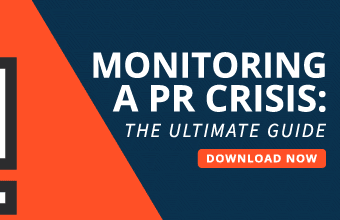When the going gets tough, many of us tend to either say too much, or nothing at all.
Turns out, neither of those tactics work in business. When disaster strikes, staying quiet is a close second to the devastating effects of foot-in-mouth.
In recent years we’ve seen some compelling examples of burying-your-head-in-the-sand gone wrong. These PR catastrophes have shown us that silence is dangerous—and can take many forms.
Taking too long to speak up
In 2009, an employee of a North Carolina Domino’s franchise filmed and uploaded a clip of a co-worker doing unsavoury things to the food before delivery. The video quickly went viral, racking up millions of views and grabbing airtime on the evening news. While Domino’s president did the right thing by issuing an apologetic video message, the 48 hours that passed before doing so was enough to incur major financial and reputational damage.
“Silence may have been a strategy in the past, but in today’s 24×7, Google search-dominated world” it speaks volumes, according to the RepMan blog. When crisis strikes, the public expects you to speak up—fast. “You don’t need to have all the answers, but you DO need to get ahead of and own the problem,” says Forbes’ contributor Davia Temin. In the early hours of a disaster, there is an opportunity to direct the narrative:The Institute for Public Relations calls silence “too passive. It lets others control the story and suggests the organization has yet to gain control of the situation.”
Trying to silence others
In 2013, a waitress at a St. Louis Applebee’s posted a receipt from a customer on Reddit. The customer was offended by the automatic 18 per cent service charge for parties of more than eight and declined to tip, scribbling “I give God 10% why do you get 18” on the receipt. Applebee’s fired the waitress for “posting customer information”, just two weeks after they had posted a picture of a note from a guest that clearly featured a guest’s name. The internet blew up and in the wake of the storm—which included around 17,000 mostly negative Facebook comments—Applebee’s responded by deleting and blocking users in the middle of the night, arguing with customers and then denying they had deleted posts.
This, of course, only made them look terrible and incensed the commenters. Moral of the story? Try to silence people and they will only get louder.
Leaving customers in the dark
A few years ago, Sony Entertainment was the victim of one of the largest data breaches in history, with over 77 million customers affected. Without a word, Sony shut down its entire system. The outrage was understandable—millions of customers were locked out of the PS Network and nervously waiting for reassurance that their credit card information was safe.
While the public wanted an explanation, customers actually needed one. But Sony waited almost a week to issue a statement confirming that they didn’t actually know if this information was secure.
All of this speaks to the importance of creating a crisis management plan: thinking of the unthinkable, and the assigned actions, roles and responsibilities of your staff so you aren’t left fumbling in radio silence—or, worse, the opposite.
Andrea Lekushoff, President of Broad Reach Communications says, “Crises can—and will—occur during the lifetime of an organization. And if you’re not prepared to handle it, the impact of that crisis can increase tenfold.”
Related: It’s too late for crisis communications in Flint, Michigan










